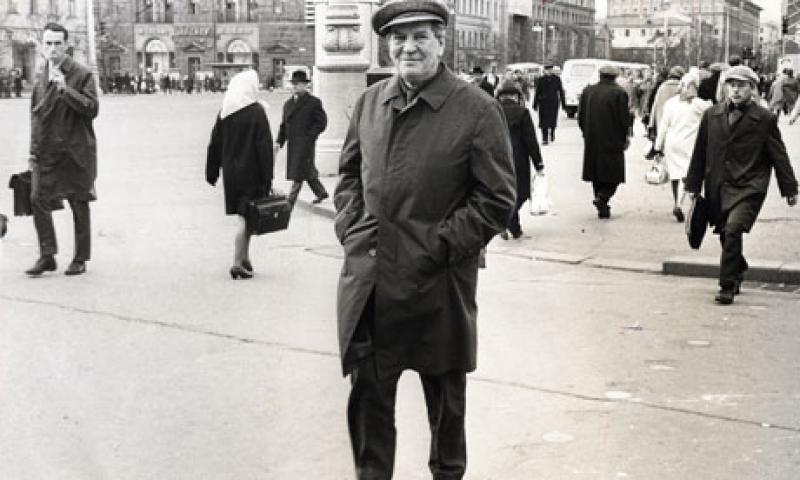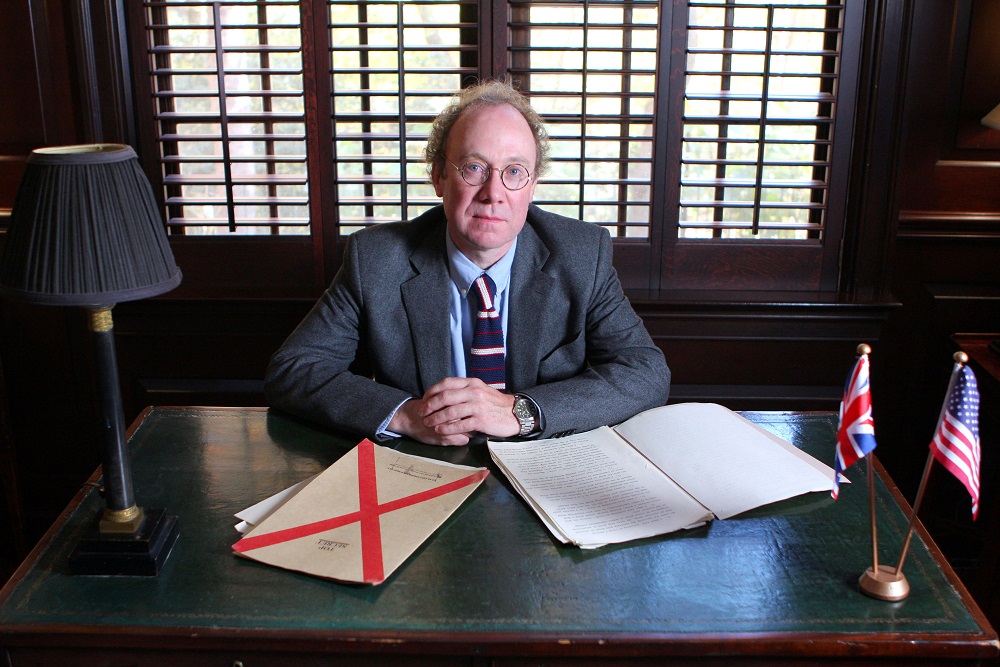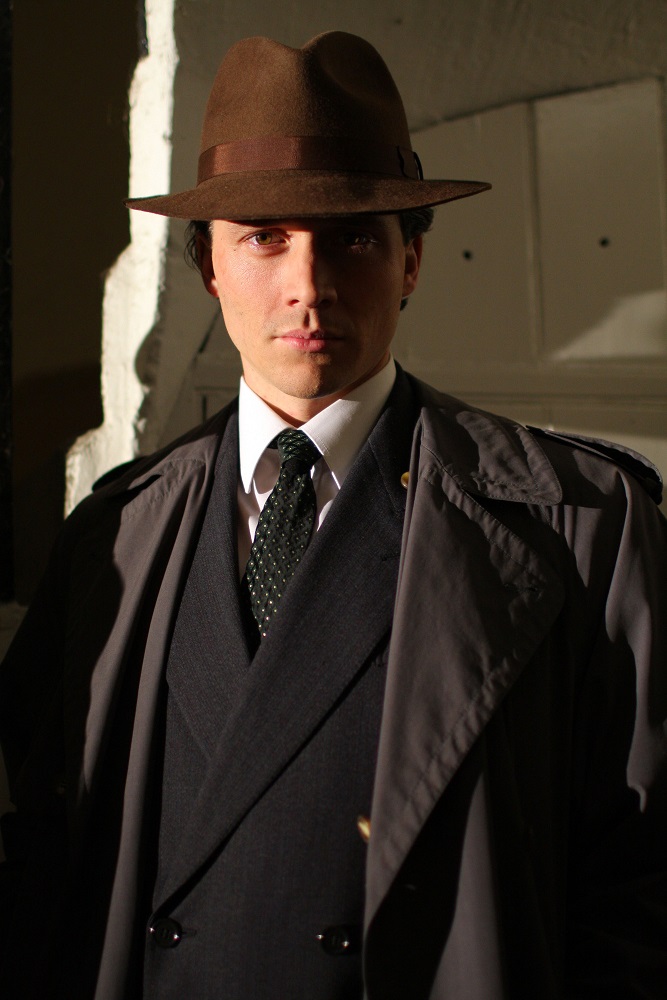Kim Philby: His Most Intimate Betrayal, BBC Two | reviews, news & interviews
Kim Philby: His Most Intimate Betrayal, BBC Two
Kim Philby: His Most Intimate Betrayal, BBC Two
The point missed on the tangled webs of treachery in over-lavish docu-drama

History may be written by the winners, but its verdict is surely still out on Kim Philby. The presenter of Kim Philby: His Most Intimate Betrayal, Ben Macintyre, acknowledged that Philby is “the most famous double agent in history”, but though such acclaim will never guarantee any kind of moral endorsement, at least it keeps his seat of notoriety warm. The fascination remains, not least for television.
Francis Whately’s two-part docu-drama is the second BBC film in a year (the first was last winter's The Spy Who Went Into the Cold by George Carey, focusing on the crucial Beirut period in 1963 that preceded Philby’s defection to Moscow). Macintyre’s real subject, however, was the spy’s close friend and espionage colleague Nicholas Elliot, and the complacent British establishment world that remained oblivious to what Philby was getting up to over so many years. These films give Elliot, who died in 1994, two hours of that enigmatic, Warholian thing, fame, after which his name will likely retreat back into the history books of espionage.
As we know from the dictatorial textbooks, history can be rewritten, and omission can be no less radical than such commission. In Macintyre’s words, the story of his films began in Berlin in 1939 with Elliot observing Hitler’s 50th birthday celebrations. But it was events from six years earlier that remain at the heart of the Philby story, meaning his time in Vienna and his marriage to Hungarian Communist Litzi Friedmann, events that, by every account, really brought him into the Soviet orbit in which he would remain until his death in 1988. The fact that neither Vienna nor Litzi were even alluded to in this new documentary seems, mildly put, an omission.
By the late Beirut days, Philby was often falling-over blotto – drink being perhaps the spy’s most reliable friend
What His Most Intimate Betrayal did reveal in spades, however, was the ridiculously insider nature of the way in which the British intelligence community brought in new recruits on the eve of World War II (“I knew his people,” was one typical endorsement from on high that welcomed Philby into that world). It was a world of Eton, Cambridge and cricket, copious drinking in London gentlemen's clubs and chummy conversations at their urinals, with its trademark vocabulary of “old chap” and “coming in for a friendly chat”.
How blind it really was to risk, especially anything originating from “inside”! Elliot never really distinguished himself by his competence, either: his crucial 1963 interrogation of Philby in Beirut was messed up by the fact that he opened a window, and so interfered with the tape recording, so no true record of the event remains – thus, it’s only his testimony that we are left with. (The botched incident in Portsmouth harbour in 1956 with Colonel Crabbe disappearing under Nikita Khrushchev’s cruiser was on Elliot’s watch, too.)
 The biggest, possibly only coup of Elliot’s career was his extrication of the defecting Abwehr agent Erich Vermehren from Istanbul in 1943, who brought with him, along with a huge range of other documents, lists of German opponents of Communism. (Philby, of course, passed them to Moscow, so trying to find any of them after the war revealed a series of assassinations by Soviet “death squads”. No disagreeing with Macintyre’s verdict that this was a “secret, sordid tragedy”.)
The biggest, possibly only coup of Elliot’s career was his extrication of the defecting Abwehr agent Erich Vermehren from Istanbul in 1943, who brought with him, along with a huge range of other documents, lists of German opponents of Communism. (Philby, of course, passed them to Moscow, so trying to find any of them after the war revealed a series of assassinations by Soviet “death squads”. No disagreeing with Macintyre’s verdict that this was a “secret, sordid tragedy”.)
But Vermehren, snitched out of Istanbul with his wife by Elliot in a staged kidnapping and ferried via Cairo to London, was also a man of principles, of conviction, driven on by his Catholic beliefs, which became those of opposition to Nazism – exactly the same motives that had driven Philby to his 1933 decision in Vienna. Passing any verdict on treachery is a treacherous business.
Which makes reaching a neutral judgement on Philby almost impossible. His faith in those original ideals never left him, even when after his defection he wasn’t really given any meaningful role in the KGB (there had been suspicions too that the wartime information coming from him in London, as well as Guy Burgess and Donald Maclean, was just too good to be true). As testimonies go, however, little reads truer than the words of his widow, Rufina, whom he married in Moscow. “He saw people suffering too much,” she wrote, but he consoled himself by arguing that, “the ideals were right but the way they were carried out was wrong. The fault lay with the people in charge [of Communism].”
There were plenty of revealing details in His Most Intimate Betrayal, offering a little bit of an insight into Philby the man, even if that remains the most elusive concept. None more so than his anger at his discovery of his second wife Aileen’s affliction with Munchausen syndrome, which saw her self-harming to attract attention. She’d hoodwinked him, Macintyre noted: “The deceiver had been deceived”. Was that really a less "intimate betrayal" than his manipulation of a gullible pal whom he'd been hoodwinking throughout their acquaintance? Philby was a shit on all fronts.
 His Most Intimate Betrayal was a lavish film, beautifully shot in locations which took in Beirut, Istanbul, Washington and Moscow, but rather too much of a solo job for Macintyre (it could well have resisted some gimmickry too, like the scene in which the presenter appeared on screen in preposterous triplicate). The only two interviewees Macintyre (pictured, above right, images by Ben Ryder) spoke to in this first episode were Elliot’s son Mark, and the impressive Rozanne Colchester (her connection to Philby was never a crucial one, however). By contrast, Carey’s film from last year, shot without any such largesse, was awash with a whole crew of the spy's past acquaintances.
His Most Intimate Betrayal was a lavish film, beautifully shot in locations which took in Beirut, Istanbul, Washington and Moscow, but rather too much of a solo job for Macintyre (it could well have resisted some gimmickry too, like the scene in which the presenter appeared on screen in preposterous triplicate). The only two interviewees Macintyre (pictured, above right, images by Ben Ryder) spoke to in this first episode were Elliot’s son Mark, and the impressive Rozanne Colchester (her connection to Philby was never a crucial one, however). By contrast, Carey’s film from last year, shot without any such largesse, was awash with a whole crew of the spy's past acquaintances.
The dramatic reconstructions in the film couldn’t be faulted professionally, either – except for the fact that they looked so lavish. David Oakes (pictured, above left) as Philby made us understand the man’s charms, not to mention his verve, as he outplayed the rather nerdy Elliot (William Beck). But faces don’t lie; you only have to look at an image from that informal 1955 press conference that Philby called, with such astonishing chutzpah, after he’d been vindicated in parliament by Anthony Eden, to see the stress there. By the late Beirut days, he was often falling-over blotto – drink being perhaps the spy’s most reliable friend – and light years away from the fresh daisy appearance that Oakes gave him here. Hard to escape the conclusion that Philby has been glamorised, unexpectedly, and from the most unexpected quarter.
- The second episode of Kim Philby: His Most Intimate Betrayal is on BBC Two, Thursday 3 April
Add comment
The future of Arts Journalism
You can stop theartsdesk.com closing!
We urgently need financing to survive. Our fundraising drive has thus far raised £49,000 but we need to reach £100,000 or we will be forced to close. Please contribute here: https://gofund.me/c3f6033d
And if you can forward this information to anyone who might assist, we’d be grateful.

Subscribe to theartsdesk.com
Thank you for continuing to read our work on theartsdesk.com. For unlimited access to every article in its entirety, including our archive of more than 15,000 pieces, we're asking for £5 per month or £40 per year. We feel it's a very good deal, and hope you do too.
To take a subscription now simply click here.
And if you're looking for that extra gift for a friend or family member, why not treat them to a theartsdesk.com gift subscription?
more TV
 Hill, Sky Documentaries review - how Damon Hill battled his demons
Alex Holmes's film is both documentary and psychological portrait
Hill, Sky Documentaries review - how Damon Hill battled his demons
Alex Holmes's film is both documentary and psychological portrait
 Outrageous, U&Drama review - skilfully-executed depiction of the notorious Mitford sisters
A crack cast, clever script and smart direction serve this story well
Outrageous, U&Drama review - skilfully-executed depiction of the notorious Mitford sisters
A crack cast, clever script and smart direction serve this story well
 Prost, BBC 4 review - life and times of the driver they called 'The Professor'
Alain Prost liked being world champion so much he did it four times
Prost, BBC 4 review - life and times of the driver they called 'The Professor'
Alain Prost liked being world champion so much he did it four times
 The Buccaneers, Apple TV+, Season 2 review - American adventuresses run riot in Cornwall
Second helping of frothy Edith Wharton adaptation
The Buccaneers, Apple TV+, Season 2 review - American adventuresses run riot in Cornwall
Second helping of frothy Edith Wharton adaptation
 The Gold, Series 2, BBC One review - back on the trail of the Brink's-Mat bandits
Following the money to the Isle of Man, Spain and the Caribbean
The Gold, Series 2, BBC One review - back on the trail of the Brink's-Mat bandits
Following the money to the Isle of Man, Spain and the Caribbean
 Dept. Q, Netflix review - Danish crime thriller finds a new home in Edinburgh
Matthew Goode stars as antisocial detective Carl Morck
Dept. Q, Netflix review - Danish crime thriller finds a new home in Edinburgh
Matthew Goode stars as antisocial detective Carl Morck
 The Rise and Fall of Michelle Mone, BBC Two - boom and bust in the lingerie trade
Life in the fast lane with David Cameron's entrepreneurship tsar
The Rise and Fall of Michelle Mone, BBC Two - boom and bust in the lingerie trade
Life in the fast lane with David Cameron's entrepreneurship tsar
 Code of Silence, ITVX review - inventively presented reality of deaf people's experience
Rose Ayling-Ellis maps out her muffled world in a so-so heist caper
Code of Silence, ITVX review - inventively presented reality of deaf people's experience
Rose Ayling-Ellis maps out her muffled world in a so-so heist caper
 The Bombing of Pan Am 103, BBC One review - new dramatisation of the horrific Lockerbie terror attack
Six-part series focuses on the families and friends of the victims
The Bombing of Pan Am 103, BBC One review - new dramatisation of the horrific Lockerbie terror attack
Six-part series focuses on the families and friends of the victims
 theartsdesk Q&A: Zoë Telford on playing a stressed-out psychiatrist in ITV's 'Malpractice'
She nearly became a dancer, but now she's one of TV's most familiar faces
theartsdesk Q&A: Zoë Telford on playing a stressed-out psychiatrist in ITV's 'Malpractice'
She nearly became a dancer, but now she's one of TV's most familiar faces
 The Trunk, Netflix review - stylish, noir-ish Korean drama wrapped around a beguiling love story
Unusual psychological study of a stranger paid to save a toxic marriage
The Trunk, Netflix review - stylish, noir-ish Korean drama wrapped around a beguiling love story
Unusual psychological study of a stranger paid to save a toxic marriage
 Malpractice, ITV1, Series 2 review - fear and loathing in the psychiatric unit
Powerful return of Grace Ofori-Attah's scathing medical drama
Malpractice, ITV1, Series 2 review - fear and loathing in the psychiatric unit
Powerful return of Grace Ofori-Attah's scathing medical drama

Comments
the strongest impressions
I can't really top your
An entertaining spy romp in
smug is not the
Endorsing treachery is a
"To betray, you first have to